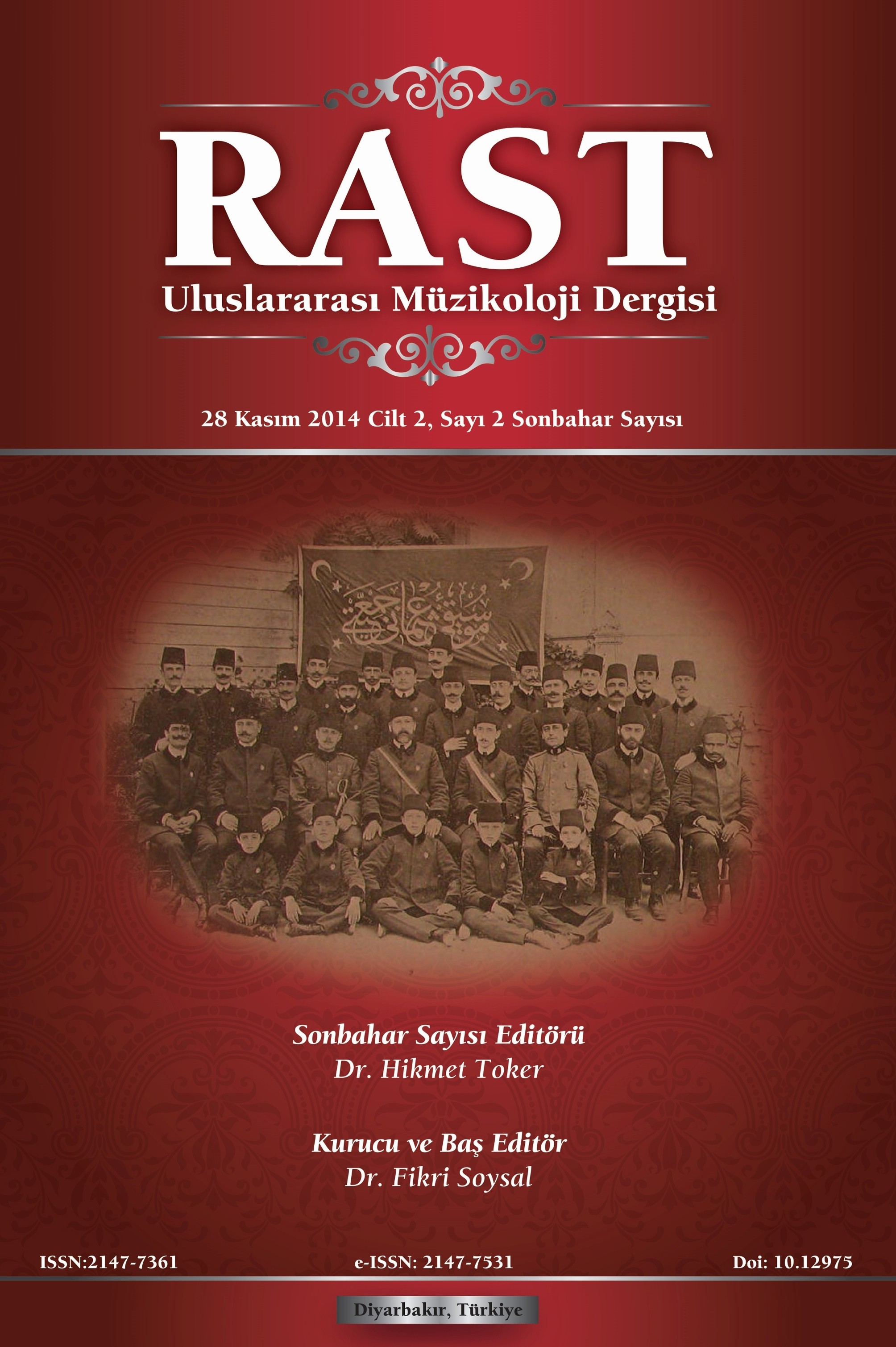
Rast Müzikoloji Dergisi
Yazarlar: Nuri GÜÇTEKİN
Konular:Müzik
DOI:10.12975/pp2412-2443
Anahtar Kelimeler:History of turkish music,Gınâ-mûsikî education,Faize ergin,Laika karabey,Kirkor mehteryan,Kirkor çulhayan,Arif hikmet bey
Özet: The three-volume work entitled Maariften Milli Eğitime İstanbul Sicilleri (Istanbul Registries from Maarift to National Education) (1878-1965), which was addressed based on the Ottoman register files of 627 personnel in the Zeytinburnu Registry Archive of Istanbul Directorate of National Education, also constitutes the first bibliography published for educators. In this study, the biographies of 23 educators, who were employed in public service as Gınâ, Gınâ-Mûsikî, or Mûsikî teachers in official and general education institutions at the primary, secondary, and high school levels in Istanbul during the last period of the Ottoman Empire and the first decade of the Republic, were included based on the work published. With new documents, information, and findings, it was attempted to contribute to the literature on the History of Turkish Music and Gınâ/Mûsikî education in schools. The primary education institution of the Ottoman Empire in the classical period was madrasahs. Madrasahs that were successful during the establishment and development periods played a significant role in the Ottoman Empire becoming a world state. In addition to administrators’ preferences for Western education institutions, the inadequacy of madrasahs that could not produce alternatives while new expansions were made in the European model and their failure to keep their former positions played a significant role in the Tanzimat period during which the Ottoman Empire was subjected to European-style reforms. This process resulted in the opening of European-style institutions at the university level and primary, secondary, and high school levels. In a sense, the fall of madrasahs caused the Ottoman Empire to become a state that could not renew its institutions within the framework of its civilization and that established new institutions by importing from elsewhere. The biographies of a total of 23 Gınâ/Mûsikî course teachers consisting of 6 males and 17 females, who worked under the name of Gınâ, Mûsikî and sometimes Gınâ/Mûsikî teachers at different times in official and private education institutions in Istanbul, were discussed. The registration number, gender, place of birth, father’s occupation, age at the start of service when involved in public service, graduation, name of the course for which certificate was received, branch in the institution to which they were appointed, military status if male, languages they spoke, date and reason for leaving office, and total service time are presented in the attached table. The first condition to be employed in public service was to have a certificate indicating at which level Gınâ/Mûsikî lesson could be studied and practiced. It is observed that while 9 of the educators in the study had the Gınâ certificate, 2 of them had the Mûsikî-i Rûhânî First Class Teacher’s certificate, 6 of them had the Mûsikî Teaching certificate, and 6 of them received music education. They were appointed as intern teachers after being successful in the exam held in the presence of the İstanbul Vilayeti Tedrisat-ı İbtidâiye Meclisi (Istanbul Province Primary Education Council). Moreover, the certificates given as a result of the examinations of the Maarif-i Umumiye Nezareti Mûsikî Encümeni (the Ministery of Public Education Music Commission), Dersaadet Ermeni Patrikhanesi Maarif Komisyonu (Dersaadet Armenian Patriarchate Education Commission), Dârülelhan Mûsikî Encümeni (Dârülelhan Music Commission), and Şark Mûsikî Cemiyeti (Oriental Music Society) were also valid.